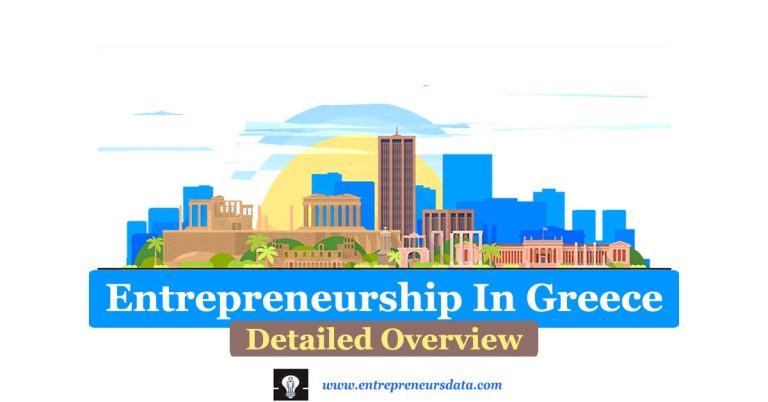Entrepreneurship in Ireland: Detailed Overview – Ireland has become a hotspot for business ventures, with a thriving ecosystem that fosters and supports the aspirations of innovative entrepreneurs. The Irish environment is brimming with creativity, innovation, and an unbroken spirit of enterprise, from the charming streets of Dublin to the buzzing startup centers in Galway, Cork, and beyond.
In this detailed overview, we’ll set out on an adventure to investigate Ireland’s thriving entrepreneurial sector and identify the essential elements that make it the perfect environment for budding entrepreneurs. We will explore the vital role that entrepreneurship plays in Ireland’s economy, the expanding sectors, and the proactive programs in place. Let’s move to the content.
Entrepreneurship in Ireland – Economic Overview for Entrepreneurship
Entrepreneurship drives economic growth in Ireland. The government supports entrepreneurs through various measures. Let’s investigate the economic environment in Ireland using the most recent data and crucial success indicators.
Ireland placed 11th among 50 nations in the Global Entrepreneurship Monitor 2021 report for entrepreneurial activity. Ireland had a higher early-stage entrepreneurship rate in 2021 than the OECD average of 11.6%, at 12.5%. In comparison to the OECD average of 6.3%, the established firm ownership rate was higher at 6.9%.
Ireland’s supportive ecosystem is influenced by its favorable tax environment, competitive business costs, skilled labor force, and EU membership. The 12.5% corporate tax rate attracts businesses to expand and operate in Ireland. With an emphasis on STEM education, the country’s skilled labor force enables entrepreneurs to recruit and employ professionals with ease.
Additionally, Irish entrepreneurs have the opportunity to expand thanks to access to a market with more than 500 million consumers through EU membership. To assist entrepreneurs in obtaining money, developing their business abilities, and learning from seasoned mentors, the government offers financial assistance, mentoring, and training programs.
Read – Can Anyone Be an Entrepreneur
Small Business Statistics in Ireland
Small and medium-sized businesses are vital to the Irish economy. Ireland is home to about 260,000 SMEs. 99.8% of all enterprises are comprised of them. This demonstrates their significance to the economy. With an average employee count of fewer than ten, the majority of these SMEs are micro-enterprises.
Retail, construction, professional services, and the tourism industry are just a few of the industries where SMEs flourish. Their average turnover is approximately €1.2 million, showcasing their substantial economic impact. Moreover, SMEs in Ireland are active exporters, with annual exports of goods and services exceeding €50 billion. This demonstrates their significant role in international trade.
With over 1.3 million employees or 68% of the overall workforce in Ireland, SMEs play a significant role in job creation. This highlights how important a role they play in forming jobs and preserving lives. SMEs are leading the charge in efforts to create jobs, lowering unemployment rates, and promoting economic expansion.
Read – Entrepreneurs in Canada
Doing Business Overview of Ireland Entrepreneurship
Ireland has established a solid reputation for supporting entrepreneurship, offering favorable conditions for businesses to thrive. The World Bank’s Doing Business 2023 report ranks Ireland 11th out of 190 economies for ease of doing business, taking into account various factors such as business setup, property registration, and investor protection.
The high position Ireland received in the Doing Business report is the result of several important factors. First off, the nation has a welcoming tax climate with a low corporate tax rate of 12.5%, which draws companies to open up shop or expand within its boundaries. The competitive business costs, including low labor expenses and a tax system that encourages competitiveness, further enhance Ireland’s appeal.
Ireland’s skilled labor force, centered on STEM education, offers a pool of qualified professionals for businesses. The country’s membership in the European Union allows businesses to expand into Europe, tapping into a vast market. The Irish government supports entrepreneurs through financial assistance, training programs, and mentoring. However, challenges include access to finance, a skills gap in STEM and digital fields, and complex regulatory environments. Addressing these issues is crucial for Ireland’s continued growth in entrepreneurship.
Read – Setting up a Company in Australia
GDP Per Capita and GDP Growth Rate in Ireland’s Entrepreneurship
| Year | 2016 | 2017 | 2018 | 2019 | 2020 | 2021 | 2022 |
| GDP Per capita ($) | 62 896$ | 69 971$ | 79 250$ | 80 927$ | 85 420$ | 100 172$ | 104 039$ |
| GDP Growth Rate (%) | 2% | 9% | 8.5% | 5.4% | 6.2% | 13.6% | 12% |
The Gross Domestic Product per capita and GDP growth rate are crucial metrics for assessing a country’s economic health. Ireland’s GDP per person grew substantially between 2016 and 2022. The GDP per person was $62,896 in 2016. 2022, it had climbed to $104,039 per person. The country’s economic success and the beneficial effects of entrepreneurship on Ireland’s general wealth are reflected in this large increase.
Ireland’s GDP growth rate climbed steadily from 2% to 13.6% between 2016 and 2022. It demonstrates their tenacity and entrepreneurial spirit as an engine of economic progress. Ireland’s extraordinary 9% GDP growth rate in 2017. It was credited to innovation and entrepreneurship. Ireland experienced remarkable growth rates in 2021 and 2022 of 13.6% and 12%, respectively. Successful entrepreneurs increase wealth, employment, and productivity, which raises a country’s GDP.
Read – Disadvantages of Entrepreneurship
Entrepreneurship Intention in Ireland
In recent years, there has been a noticeable surge in entrepreneurship intention in Ireland. This growing trend can be clarified in several aspects. These factors have fostered an environment that is favorable for prospective entrepreneurs. Some of the key drivers include Ireland’s rapid economic growth and the government’s proactive support of entrepreneurship. Also, the expanding potential of the digital economy.
Ireland had a remarkable 12.5% percentage of early-stage entrepreneurship, according to a 2019 Global Entrepreneurship Monitor report. It was higher than the 11.6% OECD average. Additionally, 6.9% of Ireland’s established businesses were owned by its citizens. Compared to the OECD average of 6.3%, it was greater.
Ireland’s entrepreneurship intention is strong, benefiting the economy and driving innovation, economic growth, and job creation. The supportive ecosystem, including favorable policies, resources, and a culture celebrating entrepreneurship, fuels this intention. Entrepreneurs disrupt traditional industries and create employment opportunities, contributing to the overall vitality of the labor market.
Women and Youth Entrepreneurship in Ireland
Ireland is seeing a phenomenal increase in women and youths starting businesses, thanks to a welcoming atmosphere and committed programs. Women and young people can now establish and expand their businesses because of the nation’s great record of entrepreneurship support.
Women Entrepreneurship in Ireland
Ireland has higher rates of female entrepreneurship than the OECD average. It shows that there is a vibrant business environment for women. According to reports, Ireland’s early-stage female entrepreneurship rate was 10.5%. According to the Global Entrepreneurship Monitor 2021 survey, they were higher than the OECD average of 9.6%.
The rise of women entrepreneurs in Ireland is influenced by several variables. by offering specialized assistance initiatives like the Women in Business Action Plan. the Women’s Entrepreneurship Academy as well. The role of the government in the economy is crucial. Their initiatives support the development of female entrepreneurs. They provide them access to information, coaching, and networking possibilities.
The entrepreneurial culture in Ireland also values diversity. They recognize the significant contributions women create to the economy. Female role models in various industries inspire and encourage aspiring women entrepreneurs, breaking barriers and paving the way for future success.
Access to finance is another key factor driving women’s entrepreneurship in Ireland. The availability of government grants, loans, and venture capital sources specifically tailored to support women entrepreneurs helps bridge the funding gap and facilitates their business growth.
Read – Ethics in Entrepreneurship
Youth Entrepreneurship in Ireland
Youth entrepreneurship in Ireland also surpasses the OECD average, indicating a dynamic environment for young individuals to venture into business. The GEM 2021 report reveals that the rate of early-stage youth entrepreneurship (YEF) in Ireland reached 16.4%, surpassing the OECD average of 14.9%.
Access to education is a crucial element in supporting young entrepreneurs in Ireland. STEM education is highly valued across the country. Young entrepreneurs are receiving the knowledge and abilities they require to thrive in the digital economy. They may use technology and innovation to establish and grow their enterprises thanks to this educational focus.
Young people are more encouraged to pursue their entrepreneurial dreams, which helps Ireland’s entrepreneurial culture foster youth entrepreneurship. Young entrepreneurs who have found success as business owners serve as inspiration for them and numerous programs, such as the Young Entrepreneur Programme and the National Enterprise Network, support them by offering advice, mentorship, and resources specifically suited to their needs.
Read – Youth Entrepreneurship
Investments & National Plans for Ireland in Entrepreneurship
The Irish government is firmly devoted to creating a healthy entrepreneurial ecosystem, and as part of this commitment, they have put in place several investments and national policies to offer comprehensive support to business entrepreneurs all around the nation. Let’s examine each project in detail to comprehend its importance and effects.
The Start-up Entrepreneur Programme (STEP)
To assist determined entrepreneurs who are beginning high-potential enterprises, the government-funded Start-up Entrepreneur Programme (STEP) is extremely important. Entrepreneurs that participate in STEP receive crucial coaching and financial support. It encourages them to overcome early barriers and grow their businesses to success. Through this program, entrepreneurs are not only given the financing they need to launch new business concepts but they are also given the support and knowledge they need to successfully negotiate the challenges of the business world.
The Women in Business Action Plan
The Irish government launched the Women in Business Action Plan to promote gender diversity and give women entrepreneurs more authority. This government-led initiative aims to increase the representation and involvement of women in business. By providing targeted support, mentorship, and resources geared to the specific problems experienced by women in business, this strategy seeks to create a more friendly and supportive atmosphere. It acknowledges the significant benefits that female entrepreneurs have on the economy and society at large.
The National Enterprise Network (NEN)
The National Enterprise Network (NEN) is a sizable network of regional business centers serving companies of various kinds in Ireland. This network offers thorough support services, advice, and help, making it a significant resource for business owners. The NEN makes sure that aspiring and established firms have access to a variety of services, including training programs, mentorship, and funding opportunities by creating a strong relationship between entrepreneurs and local enterprise offices. This extensive support system is crucial in fostering the expansion and progress of companies across Ireland.
The National Development Plan 2018-2027
The government’s goals and vision for economic growth are spread forth in the National Development Plan. It’s a fresh long-term strategy. This ten-year plan comprises a range of programs developed to boost entrepreneurship and innovation. It outlines strategies for monetary support and skill-development initiatives. Also the creation of training programs to equip entrepreneurs with the tools and know-how they need. Especially to prosper in the dynamic business climate. By integrating their efforts with the National Development Plan, entrepreneurs can use the resources at their disposal to advance their ventures.
Read – Entrepreneurship in South Africa
Ireland Entrepreneur Visa
A government-funded initiative called the Ireland Entrepreneur Visa (STEP) helps prospective entrepreneurs to launch high-potential enterprises in Ireland. By supporting entrepreneurs as they build their enterprises and produce jobs for citizens, this project seeks to stimulate economic growth.
To be eligible for the STEP program, you must fulfill some conditions.
1. Non-EEA National – Applicants must be foreign nationals. Seeking to launch a business in Ireland.
2. Business Plan: A thorough business plan is necessary for an Irish venture with high potential.
3. finance: The prospective business must receive a minimum of €50,000 in finance.
4. English Language Proficiency: It’s imperative to speak and write English fluently.
Those who are accepted into the STEP program are given a one-year residency visa in Ireland. During this time, Enterprise Ireland, the government organization devoted to assisting entrepreneurs, provides them with financial assistance and mentoring. Entrepreneurs might be able to seek for permanent residency status if their business succeeds, further establishing them in Ireland.
Read – Entrepreneurship in Germany
Entrepreneurship Education in Ireland
Due to the Irish government’s recognition of its relevance and the implementation of numerous programs to assist it, entrepreneurship education is becoming increasingly important in Ireland. The National Entrepreneurial Education Strategy is one such project that seeks to incorporate entrepreneurial education within the Irish educational system. This strategy focuses on recommendations like developing a national entrepreneurship curriculum and providing teacher training to effectively impart entrepreneurial skills to students.
The Student Enterprise Programme and Young Entrepreneur Programme provide government-funded support to students and young entrepreneurs in Ireland, offering training, mentoring, and funding. The private sector, including the National Digital Research Centre and Irish Business and Employers Confederation, also supports entrepreneurship education through programs and services. These partnerships promote an entrepreneurial ecosystem and increase Ireland’s attractiveness as a business location, fostering the development of the following generation of creative and prosperous entrepreneurs.
Numerous programs in entrepreneurship studies are available in Ireland.
01. Bachelor of Business Studies at the National University of Ireland Galway
02. Master of Business Administration at Dublin Business School
03. Limerick Institute of Technology – Bachelor of Arts in Entrepreneurship
These initiatives aim to ready students for the opportunities and challenges of the entrepreneurial world. They help them embrace an entrepreneurial attitude. They place a lot of focus on leadership, creativity, and business development.
Read – Difference Between Entrepreneurship and Management
Entrepreneurship Eco-System in Ireland
The growth and success of Irish entrepreneurs are supported by several important stakeholders in the ecosystem. Let’s examine a few of these parties and their functions:
1. Government
The Irish government makes a substantial contribution to the assistance of entrepreneurs through a variety of initiatives and programs. They provide financial aid, tax benefits, and coaching to help business owners launch and grow their enterprises. An example of this kind of assistance is the Start-up Entrepreneur Programme, which offers funding and guidance to high-potential start-ups.
2. Enterprise Ireland
As a government agency, Enterprise Ireland concentrates its efforts on helping startups and entrepreneurs. They offer a wide range of services and initiatives, including funding, mentoring, and market analysis. As an illustration, the High Potential Start-Up program assists and finances potential start-ups.
3. Local Enterprise Offices (LEOs)
LEOs are government facilities dispersed throughout Ireland that offer assistance to companies of all sizes. They provide services and initiatives like funding, mentoring, and training. For instance, the LEO Start-Up Hub helps early-stage companies by giving them access to valuable networks, office space, and coaching.
Read – Corporate Entrepreneurship
4. Business Incubators
Early-stage enterprises can benefit greatly from the assistance of business incubators. To support the growth of entrepreneurs, they provide resources like office space, mentoring, and networking opportunities. An Irish business incubator that helps technology entrepreneurs is the National Digital Research Centre (NDRC).
5. Accelerators
Early-stage enterprises receive rigorous help from accelerator programs, usually in the form of cash, coaching, and network access. Ireland has an accelerator program called Springboard Accelerator that supports tech start-ups in their early phases.
6. Angel Investors
Angel investors are those who put their own money into start-up companies. They frequently offer mentorship and direction to the firms they invest in in addition to financial support. Angel investors that actively invest in promising early-stage enterprises make up groups like the Angels Network Ireland.
7. Venture Capitalists
Companies known as venture capitalists pool investor cash to invest in early-stage companies. They assist the businesses they invest in financially and frequently advise and guide them. Accel Partners, one of Ireland’s well-known venture capital organizations, specializes in supporting early-stage technology start-ups.
Read – Scalable Startup Entrepreneurship
Trends in Entrepreneurship in Ireland
The entrepreneurship landscape in Ireland is experiencing several notable trends that are shaping its growth and development. Let’s explore some of these trends:
1. Increase in Female Entrepreneurship
Female entrepreneurship is significantly increasing in Ireland. As more women pursue entrepreneurship and launch their enterprises, the economy becomes more diverse and innovative. Ireland’s early-stage female entrepreneurship rate is higher than the OECD average, demonstrating the expanding prospects for female business owners.
2. Growing Number of Tech Startups
Ireland is become a hub for tech companies. These startups are showing the lead in developing cutting-edge products and services. An increasing number of technology-driven businesses have drawn attention thanks to the nation’s welcoming business environment, talent availability, and supportive ecosystem.
3. Increase in International Investment
Startups in Ireland are drawing a sizable amount of foreign investment. This flood of capital is helping these firms grow and expand, generating new employment possibilities, and promoting economic growth. International investors are aware of the promise and potential of Irish business endeavors.
4. Focus on Sustainability
Sustainable business practices are becoming more and more important to Irish business owners. The significance of creating environmentally friendly goods and services is becoming more widely recognized. Startups are innovating in fields like sustainable agriculture, waste reduction, and renewable energy, aligning their companies to build a better future.
Read – Radical Innovations
Future of Entrepreneurship in Ireland
Ireland’s entrepreneurial scene is changing in ways that hold considerable potential for the future. Let’s investigate a few of these trends and their effects.
Continued Growth of the Digital Economy
The constantly growing digital economy offers new opportunities for business enterprises. Irish entrepreneurs, who are renowned for their skills in the technology industry, are in a good position to take advantage of this expansion. Companies like Flutterwave, an Irish-founded payments technology company, serve as examples of how Irish companies have a strong chance of succeeding overseas and flourishing in the digital sphere.
The Increasing Importance of Social Entrepreneurship
The concept of applying entrepreneurial principles to social challenges is known as social entrepreneurship. It is becoming more popular in Ireland. Irish entrepreneurs are becoming more familiar with the ability of their industry to advance society. Social entrepreneurs that aim to improve society through their enterprises are supported and empowered by organizations like Social Entrepreneurs Ireland.
Focus on Collaboration
Collaboration is becoming a cornerstone of the entrepreneurial landscape. Entrepreneurs are embracing the power of partnerships, pooling resources, knowledge, and expertise. This collaborative spirit is fostering a vibrant ecosystem where ideas flourish and innovative solutions emerge. Events such as the Irish Tech Summit bring together entrepreneurs, investors, and stakeholders to foster collaboration and catalyze collective growth.
Conclusion
As we come to the end of our detailed overview of entrepreneurship in Ireland, it is evident that the Emerald Isle is a land of boundless opportunities and entrepreneurial spirit. From its supportive government initiatives to its vibrant startup ecosystem, Ireland has fostered a culture of innovation, growth, and resilience. Entrepreneurs in Ireland are harnessing their creativity and determination. Also, they have the adaptability to shape industries, drive economic prosperity, and make a positive impact on society.
The future of Ireland’s entrepreneurship seems bright and hopeful. Ireland is ready to welcome you and support you along the way. You must be capable to launch your enterprise. You must be driven by enthusiasm and have a wonderful idea. Keep in mind that Ireland’s entrepreneurial spirit knows no limitations and will soar to new heights.
FAQs Related to Entrepreneurship in Ireland
1. Is Ireland a good place for entrepreneurs?
Yes, Ireland is a fantastic location for entrepreneurs. With numerous government initiatives and support mechanisms in place, the nation has a strong commitment to entrepreneurship. It provides an advantageous business climate, finance accessibility, a trained workforce, and a thriving entrepreneurial ecosystem.
2. Why is entrepreneurship important in Ireland?
In Ireland’s economy, entrepreneurship is essential. It promotes economic expansion, employment development, and innovation. Entrepreneurs build new enterprises, give birth to novel ideas, and support the growth of entire sectors. They promote economic diversification and a culture of innovation and competition.
3. Why is Ireland good for startups?
Ireland provides a supportive environment for startups. It offers access to funding and venture capital, a strong network of support organizations, and a skilled talent pool. Additionally, Ireland’s advantageous corporate tax rate and its membership in the European Union provide opportunities for market access and international growth.
4. Which industry is booming in Ireland?
Ireland’s economy is booming across several sectors. The technology industry—particularly digital technology and software development—has been expanding significantly. The nation has developed into a center for technology firms, luring both domestic and foreign investment. Pharmaceuticals, medical equipment, financial services, and renewable energy are further booming businesses.
5. Is it worth starting a business in Ireland?
Yes, starting a business in Ireland has several benefits. Startups find the nation to be a desirable location thanks to its robust infrastructure, competent labor, and availability of capital. Additionally, Ireland has prospects for growth and expansion due to its strategic location, competitive advantages, and EU membership.
6. How many entrepreneurs are in Ireland?
With a sizable population involved in entrepreneurship, Ireland boasts a strong entrepreneurial community. Early-stage entrepreneurship (TEA) rates in Ireland were 12.5%, according to the Global Entrepreneurship Monitor (GEM) 2021 report, showing a sizable number of entrepreneurs who are actively beginning their enterprises.











